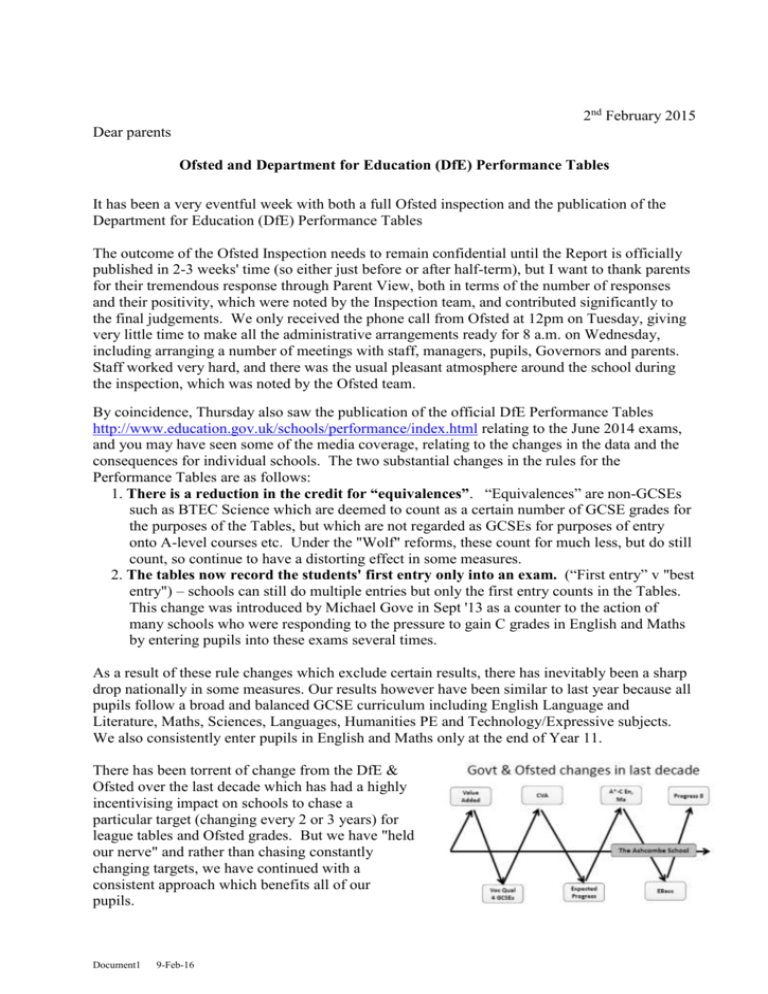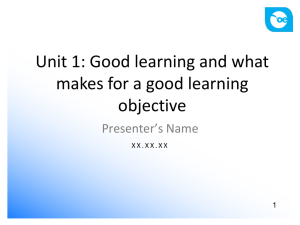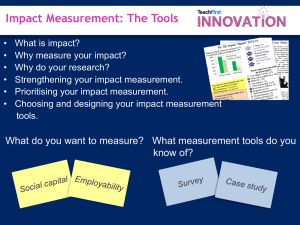See Mr Blow`s letter (2nd Feb) about the DfE
advertisement

2nd February 2015 Dear parents Ofsted and Department for Education (DfE) Performance Tables It has been a very eventful week with both a full Ofsted inspection and the publication of the Department for Education (DfE) Performance Tables The outcome of the Ofsted Inspection needs to remain confidential until the Report is officially published in 2-3 weeks' time (so either just before or after half-term), but I want to thank parents for their tremendous response through Parent View, both in terms of the number of responses and their positivity, which were noted by the Inspection team, and contributed significantly to the final judgements. We only received the phone call from Ofsted at 12pm on Tuesday, giving very little time to make all the administrative arrangements ready for 8 a.m. on Wednesday, including arranging a number of meetings with staff, managers, pupils, Governors and parents. Staff worked very hard, and there was the usual pleasant atmosphere around the school during the inspection, which was noted by the Ofsted team. By coincidence, Thursday also saw the publication of the official DfE Performance Tables http://www.education.gov.uk/schools/performance/index.html relating to the June 2014 exams, and you may have seen some of the media coverage, relating to the changes in the data and the consequences for individual schools. The two substantial changes in the rules for the Performance Tables are as follows: 1. There is a reduction in the credit for “equivalences”. “Equivalences” are non-GCSEs such as BTEC Science which are deemed to count as a certain number of GCSE grades for the purposes of the Tables, but which are not regarded as GCSEs for purposes of entry onto A-level courses etc. Under the "Wolf" reforms, these count for much less, but do still count, so continue to have a distorting effect in some measures. 2. The tables now record the students' first entry only into an exam. (“First entry” v "best entry") – schools can still do multiple entries but only the first entry counts in the Tables. This change was introduced by Michael Gove in Sept '13 as a counter to the action of many schools who were responding to the pressure to gain C grades in English and Maths by entering pupils into these exams several times. As a result of these rule changes which exclude certain results, there has inevitably been a sharp drop nationally in some measures. Our results however have been similar to last year because all pupils follow a broad and balanced GCSE curriculum including English Language and Literature, Maths, Sciences, Languages, Humanities PE and Technology/Expressive subjects. We also consistently enter pupils in English and Maths only at the end of Year 11. There has been torrent of change from the DfE & Ofsted over the last decade which has had a highly incentivising impact on schools to chase a particular target (changing every 2 or 3 years) for league tables and Ofsted grades. But we have "held our nerve" and rather than chasing constantly changing targets, we have continued with a consistent approach which benefits all of our pupils. Document1 9-Feb-16 Not only are our attainment measures impressive, such as 80% A*-C in English and also in Maths, but the Value-Added (VA) (which takes account of the KS2 prior attainment of pupils) is also well above national average for English, Maths and the EBacc subjects. Our focus has always been on getting the best grades for all pupils and not just focussing on the C/D borderline, and this is confirmed by these VA figures. Overall our pupils, on average, are gaining one-third of a grade higher in Maths than "expected" in comparison with pupils nationally. More detailed information is published on the DfE / Ofsted RAISE website which gives the national figures for each GCSE subject showing how many pupils get each GCSE grade from each KS2 sub-level. We can then compare our results against these national figures. These show the strength of the school's performance across subjects and across the ability range. For example, in Additional Science (the harder of the two Science GCSEs, which is taken by all our pupils), the most able pupils are gaining two-thirds of a grade higher than "expected" in comparison with national. Our lower ability pupils are gaining half-a grade higher than "expected" in English Literature. We are very much looking forward to the publication of the Ofsted Report which will include the Inspectors' view on the broader, less measurable aspects of the school's work for the pupils to complement these very pleasing attainment figures. All of this is only possible through the hard work of staff and the commitment of parents to working with the school for the benefit of the pupils, and I would like to thank everyone for their contributions which really do make a difference. Yours sincerely D.J. Blow Headteacher 2




![afl_mat[1]](http://s2.studylib.net/store/data/005387843_1-8371eaaba182de7da429cb4369cd28fc-300x300.png)



